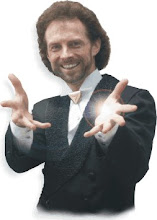Attitude to Magic
I wholeheartedly think that it's important to believe that the magic is real. Do I mean by this that you should actually think that you have real telekinetic or other paranormal abilities? No, not necessarily. (Although I suppose I couldn't completely rule out even that possibility completely!) What I do mean is that in the moment, when you are actually performing the magic, it's essential to be fully in the experience of the magic, and to perceive it yourself as real, as authentic. Emotionally, psychologically, physically even, you need to go fully into the experience of the magic as actually happening in the ways that you are portraying it as being. It's basically a specific type of method acting, wherein, like an actor, you fully immerse yourself, emotionally and otherwise, into the experience of the magic in whatever context it occurs.
And of course, in this context, one of the most important questions is "what is your attitude towards the magic as it happens?" Recently I've more specifically clarified my own performing attitude. For me, the experience of magic is that it is a powerful and wondrous encounter with the mystery and joy of life. Magic is powerful, but unpredictable. Sometimes I'm in complete control of this magical power, directing it exactly as I see fit. In those moments I exude power, mystery, and command. My word is law. Other times I'm just along for the ride, and I have no idea what to expect, and am often every bit as (and sometimes even more) surprised by the directions in which this magical, mysterious power expresses itself as the audience.
And I'm completely comfortable with either of these expressions of magic, and not attached to having one or the other specifically at any given moment. When I'm in complete control of the magical power, I’m not trying to use it in any egotistical way, to see myself as better than others. In fact, my intention is to share this incredibly powerful experience, to allow others to experience it through me. Then when the magic takes on a life of its own, I'm simply delighted and amazed by it, filled with the joy of wonder, and willing to share that experience as well. And often I can go from one to the other in the blink of an eye. When in the midst of exuding powerful control, I can instantly be astounded by something completely unexpected, or conversely, when caught up in delight in the thrill of the moment, I can choose to shift suddenly to a moment of an intense demonstration of my mastery of this power that I call magic. My mood, approach, and attitude can move abruptly but smoothly from one to the other from one moment to the next.
The audience is never completely sure whether I'm profoundly serious, or really just yanking their chain and having fun with them. And of course, ultimately it really is a little of both.
So what is your attitude to magic? Of course much of this you'll discover by simply letting yourself loose to explore when in actual performances. It's a process of discovery, and therein lies the art. But it's important that you find it. It might be similar, in tone at least, to what I've described as mine. But it might not. It might be completely different. Perhaps you're almost completely indifferent and even cavalier about it. Perhaps your ability to do incredible, impossible feats has become so natural to you that you almost ignore it when it happens. Like it's no big deal. But whatever it is, it needs to be uniquely and distinctly YOU! There are as many possible approaches to this as there are people who do magic.
On the technical side, your body language, sleights, and everything else, has to blend seamlessly into what you are expressing when the magic happens. But of course, that's a whole other topic!
Labels: attitudes in performing magic

